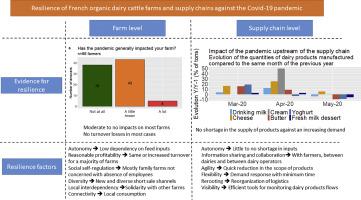Agricultural Systems ( IF 6.6 ) Pub Date : 2021-02-03 , DOI: 10.1016/j.agsy.2021.103082 Augustine Perrin 1 , Guillaume Martin 1

|
Context
Identifying and developing resilient farming and food systems has emerged as a top priority during the Covid-19 pandemic. Many academics suggest that farming and food systems should move towards agroecological models to achieve better resilience. However, there was limited evidence to support this statement during the Covid-19 pandemic.
Objective
Our objectives were to report evidence for the resilience of French organic dairy cattle farms and supply chains to the Covid-19 pandemic and to discuss the features of those farms and supply chains that promoted resilience.
Methods
We combined online surveys with farmers, semi-structured interviews with supply chain actors and a review of the gray and technical literature, and whenever possible, we compared this qualitative data against quantitative industry data. We also asked farmers to rank 19 pre-identified risks according to their likelihood and potential impacts.
Results and conclusions
We showed the pandemic had zero to moderate impacts on most farms. Among respondents, 38 farmers reported no impacts, another 43 experienced minor impacts on aspects such as their income and workload while only 5 faced major impacts, such as the closure of sales outlets. Most farms were family farms and were not greatly affected by worker availability issues. Moreover, the vast majority of these farms were nearly autonomous for livestock feeding and none reported input supply shortages or related impacts on farm functioning and productivity. The pandemic had moderate impacts on supply chains. Despite staff reductions, supply chains continued producing sufficient amounts of dairy products to meet consumer demand. To do so, they narrowed the scope of products manufactured to concentrate on a basic mix: milk, cream, butter and plain yogurt. Logistics were also adapted by hiring retired drivers to keep up with milk collection and reorganizing the delivery of products by shunting usual sub-level platforms that were saturated. Consequently, even after this pandemic, farmers remained more concerned with climate change-related risks on their farms than by sanitary risks. Several resilience factors were identified that promoted buffer and adaptive capacity at the farm level and that favored adaptive capacity at the supply chain level.
Significance
These findings confirm the relevance of agroecological models in achieving resilience in farming and food systems against shocks such as the Covid-19 pandemic. This preliminary work carried out at the end of the first lock-down period needs to be pursued in order to understand the impacts of the Covid-19 pandemic over longer time horizons.
中文翻译:

法国有机奶牛场和供应链对 Covid-19 大流行的适应力
语境
在 Covid-19 大流行期间,确定和发展有弹性的农业和粮食系统已成为当务之急。许多学者建议,农业和粮食系统应转向农业生态模式,以实现更好的恢复力。但是,在 Covid-19 大流行期间,支持这一说法的证据有限。
客观的
我们的目标是报告法国有机奶牛场和供应链对 Covid-19 大流行的恢复力的证据,并讨论那些促进恢复力的农场和供应链的特征。
方法
我们将对农民的在线调查、对供应链参与者的半结构化访谈以及对灰色和技术文献的回顾相结合,并尽可能将这些定性数据与定量行业数据进行比较。我们还要求农民根据风险的可能性和潜在影响对 19 种预先确定的风险进行排序。
结果和结论
我们表明,大流行对大多数农场的影响为零到中度。受访农户中,38户农户表示没有影响,另有43户农户收入、工作量等方面受到轻微影响,只有5户农户面临销售网点关闭等较大影响。大多数农场都是家庭农场,并没有受到工人可用性问题的很大影响。此外,这些农场中的绝大多数几乎可以自主饲养牲畜,没有一家报告投入品供应短缺或对农场运作和生产力的相关影响。大流行对供应链产生了一定程度的影响。尽管裁员,供应链继续生产足够数量的乳制品以满足消费者的需求。为此,他们缩小了生产产品的范围,专注于基本组合:牛奶、奶油、黄油和原味酸奶。物流也进行了调整,雇用退休司机跟上牛奶收集的步伐,并通过分流饱和的普通地下平台来重组产品交付。因此,即使在这次大流行之后,农民仍然更关心他们农场与气候变化相关的风险,而不是卫生风险。确定了几个恢复力因素,这些因素促进了农场层面的缓冲和适应能力,并有利于供应链层面的适应能力。
意义
这些发现证实了农业生态模型在实现农业和粮食系统抵御 Covid-19 大流行等冲击的韧性方面的相关性。这项在第一个锁定期结束时进行的初步工作需要继续进行,以了解 Covid-19 大流行在较长时间范围内的影响。


























 京公网安备 11010802027423号
京公网安备 11010802027423号